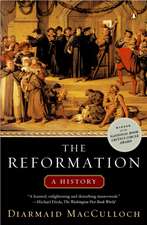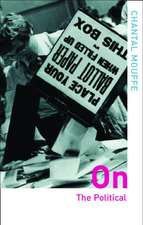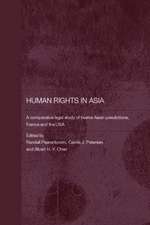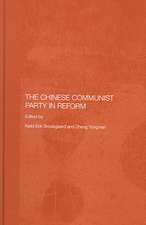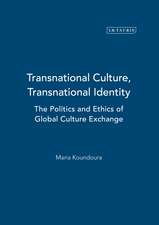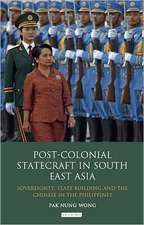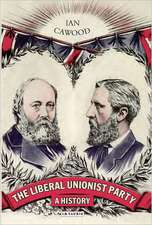Negotiating Diplomacy in the New Europe: Foreign Policy in Post-communist Bulgaria
Autor Stefanos Katsikasen Limba Engleză Hardback – dec 2011
Preț: 773.28 lei
Preț vechi: 1112.62 lei
-30% Nou
Puncte Express: 1160
Preț estimativ în valută:
147.96€ • 155.32$ • 122.81£
147.96€ • 155.32$ • 122.81£
Carte disponibilă
Livrare economică 20 martie-03 aprilie
Preluare comenzi: 021 569.72.76
Specificații
ISBN-13: 9781845118853
ISBN-10: 1845118855
Pagini: 288
Dimensiuni: 138 x 216 x 30 mm
Greutate: 0.49 kg
Editura: Bloomsbury Publishing
Colecția I.B.Tauris
Locul publicării:London, United Kingdom
ISBN-10: 1845118855
Pagini: 288
Dimensiuni: 138 x 216 x 30 mm
Greutate: 0.49 kg
Editura: Bloomsbury Publishing
Colecția I.B.Tauris
Locul publicării:London, United Kingdom
Notă biografică
Stefanos Katsikas is Lecturer in the Department of History at Goldsmiths, University of London. He holds a PhD in International Relations from the School of Slavonic and East European Studies, University College London, and is the editor of 'Bulgaria and Europe: Shifting Identities' (2010).
Cuprins
Transliteration of the Bulgarian alphabet in EnglishAcknowledgementsAbbreviationsIntroductionPost-Cold War Era, 'New Europe' and Bulgarian Diplomacy'New Europe' as a ConceptBulgarian Foreign Policy in the 'New Europe'Relations with RussiaRegime Change and Bulgarian DiplomacyThe Structure of the BookChapter I (Foreign Policy in the 1980s)Ideological Principles of Foreign PolicyForeign Policy MechanismsRelations with States from Outside the RegionBulgaria's Relations with the USSRBulgaria's Relations with the WestRelations with Pro-Soviet States of the Third WorldBulgaria's Relations in the BalkansEfforts at Multilateral CooperationBilateral Relationsa. Intra-bloc Regional Issuesb.Nationalism1.Bulgarian Turks2.Bulgarian Macedoniansc.Territorial Issuesd.Economic IssuesConclusionChapter II (From a People's to a Liberal Democracy)IntroductionForeign Policy MechanismsConstitutional AnomaliesThe Role of Personality in Foreign Policy MakingThe Presidencies of Pet?r Stoianov and Georgi P?rvanovForeign Policy Agendas of the Bulgarian Political PartiesForeign Policy Agenda of the BSPForeign Policy Agenda of the UDFForeign Policy Agenda of the NMSII/NMSPForeign Policy Agenda of he CEDBForeign Policy Agenda of the AtakaIndependent Research Policy InstitutesEvolution of Think-tanks in BulgariaMinorities and Foreign Policy MakingThe Foreign Policy Agenda of the MRFOther Minorities1.Foreign Policy Agenda of the IMRO2.Foreign Policy Agenda of UMO-IlindenPublic Opinion and Foreign Policy MakingConclusionChapter III (EU Accession and Bulgarian Foreign Policy Making)IntroductionFrom Westernization to 'Europeanization'Bulgaria's Accession to the EUThe Association Agreement of December 1992Bulgaria's Candidacy for EU MembershipIn Search for an EU Patron StateThe B?lgarski Velikden InitiativeInternational Events against EU Accession ProcessPost-Communist Europeanization and Foreign Policy MechanismsDemocratic ConditionalityForeign Policy MechanismsThe Role of the Foreign Policy Constitutional ActorsThe President of the RepublicThe Ministry of Foreign AffairsThe Council of European IntegrationThe Chief Negotiator for EU AffairsThe Ministry of European AffairsThe Coordination CouncilThe Core Negotiations TeamThe National Assembly of the Republic of Bulgaria The Role of Non-party Actors in Foreign Policy MakingConclusionChapter IV (EU Accession Process and Bulgaria's Foreign Relations)IntroductionRelations with International OrganisationsBulgaria's Relations with NATOBulgaria's Relations with the IMFDemocratic Conditionality and Inter-state RelationsRelations with Developing States in Africa, the Middle East and Latin AmericaBulgaria's Relations with the USABulgaria's Relations with the Russian FederationConclusionChapter V (Accession to the Euro-Atlantic Structures and Bulgaria's Balkan Policy (-ies))IntroductionPost-Cold War Balkan PolicyReasons for Sofia's Post-Cold War Balkan PolicyPost-1989 Security Vacuum and Bulgarian Balkan PolicyPost-1989 Territorial Policy towards its BalkansBulgaria's Minority PoliciesSofia's Diplomatic Activity Since 1989ConclusionConcluding ChapterBibliographyAppendix


